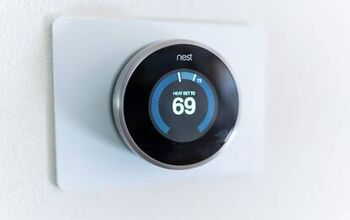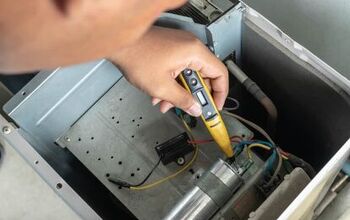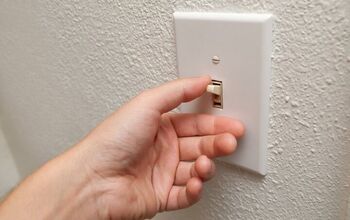Cost To Run a 1500-Watt Heater For 24 Hours

Space heaters come in handy for all homeowners, especially during fall and winter. The majority of space heaters you’ll come across run at 1,500 watts, and that is likely what you have. Now that it’s getting cooler outside, your heater will run all day, but how much will it cost?
The average cost to run a 1,500-watt heater for 24 hours is $7. Homeowners spend an average of $0.22 per hour to run a 1500-watt heater. It costs $2,555 per year if you run 1,500-watt heater 24 hours a day throughout the entire year. However, running an electric space heater for 24 hours continuously is not recommended.
The cost of running a heater is determined by the running time, wattage, and where you live. Running the heat can cost up to $18 more per day than using a 1,500-watt heater. If you have a 150 square foot room, a 1,500-watt heater is perfect for heating the space.
Follow along, and we will explore the costs of running a 1,500-watt heater for 24 hours.
Does a 1500-Watt Space Heater Use a Lot of Electricity?
While space heaters can be small and efficient, they tend to use a lot of electricity. Though, when managed properly, they don’t have to cost you a ridiculous amount of money. The amount of electricity that your space heater uses is determined by your unit’s specific wattage. This means that a 1500-watt space heater uses 1,500 watts of electricity or 1.5 kilowatts of power.
Though, your electric bill is measured in kilowatt-hours. This refers to the amount of energy it takes to run a 1-kilowatt appliance for one hour. With this in mind, the formula you can use to determine how much electricity, per hour, your space heater requires based on watts it’s pretty straightforward.
How Much Does It Cost to Run a 1500-Watt Heater for an Hour?
How much it costs to run a space heater per hour depends on where you live, as well as wattage. To determine how much your 1500-watt heater will cost you per hour, you need to know how much your electric company charges you. Then, simply multiply the wattage (1500) by your electric company’s rate.
For 1,500-watt space heaters, it typically costs between $0.15 and $0.30 per hour to operate. If you live in a big city like Los Angeles or New York, it costs closer to $0.20-$0.30 an hour. When you compare that to the $1.50 an hour for 15,000 watts of electricity, a space heater can save money.
You could spend up to $25 a day on heating your home using your central heating and air conditioning. Using a 1,500-watt heater instead could save you up to $18 each day, and that is why they are popular.
What Size Room Will A 1500-Watt Heater Heat?
A 1,500-watt heater can heat a single 150 square foot space. You could get by using a 1,500-watt heater in a larger room, but it would not be optimal.
The heating unit used is called a British thermal unit (BTU), and 1,500-watt heaters produce over 5,000 BTUs. For a 150 square foot space, you need at least 4,000 BTUs, making a 1,500-watt heater more than enough.
| Room Size | Capacity |
| 150 Square Feet | 4,000 BTU+ |
| 300 Square Feet | 6,000 BTU |
| 400 Square Feet | 9,000 BTU |
| 550 Square Feet | 12,000 BTU |
| 700 Square Feet | 14,000 BTU |
If you wanted to heat a 200-250 square foot room, you’d need a heater between 2,500 and 3,000 watts. For the average home, a 1,500-watt heater is enough for most rooms. If you use a 1,500 watt in 2-3 rooms, you can still save compared to running heat.
Is a 1500-watt Space Heater More Efficient Than My Central Heat Unit?
The quick answer to this question is, it depends. The University of Maine Extension Service reports in several bulletins on the efficiency and cost of operating many different types of heating equipment.
The extension service points out one important aspect of comparing heating systems. The actual comparison must be made using the same reference data. In other words, comparing an electric heater to a natural gas heater can’t be don’t on the cost of fuel alone. In the case of heating equipment, the common denominator is the cost per BTU.
Heating Cost Equivalents
Comparing central heat to electric space heaters yields some interesting information. This chart shows the comparisons for several different fuel types including electric space heaters.
| Type of Fuel | #2 Fuel Oil | Natural Gas | Propane | Electricity | Cost Per Million BTUs |
| System Efficiency | 85% | 95% | 95% | 100% | |
| $1.18 per gal | $0.95 | $0.88 per gal | $0.03 per KWh | $10.00 | |
| $1.41 per gal | $1.14 | $1.05 per gal | $0.04 per KWh | $12.00 | |
| $1.65 per gal | $1.33 | $1.23 per gal | $0.05 per KWh | $12.00 | |
| $1.88 per gal | $1.52 | $1.41 per gal | $0.06 per KWh | $14.00 | |
| $2.12 per gal | $1.71 | $1.58 per gal | $0.07 per KWh | $16.00 | |
| $2.35 per gal | $1.90 | $1.76 per gal | $0.08 per KWh | $18.00 | |
| $2.59 per gal | $2.09 | $1.93 per gal | $0.09 per KWh | $20.00 | |
| $2.83 per gal | $2.28 | $2.11 per gal | $0.10 per KWh | $22.00 | |
| $3.06 per gal | $2.47 | $2.28 per gal | $0.10 per KWh | $24.00 | |
| $3.30 per gal | $2.66 | $2.46 per gal | $0.11 per KWh | $26.00 | |
| $3.53 per gal | $2.85 | $2.64 per gal | $0.12 per KWh | $28.00 | |
| $3.77 per gal | $3.04 | $2.81 per gal | $0.12 per KWh | $30.00 | |
| $4.00 per gal | $3.23 | $2.99 per gal | $0.12 per KWh | $32.00 | |
| $4.24 per gal | $3.42 | $3.16 per gal | $0.13 per KWh | $34.00 | |
| $4.47 per gal | $3.61 | $3.34 per gal | $0.14 per KWh | $36.00 | |
| $4.71 per gal | $3.80 | $3.52 per gal | $0.14 per KWh | $38.00 | |
| $4.94 per gal | $3.99 | $3.69 per gal | $0.15 per KWh | $40.00 | |
| $5.18 per gal | $4.18 | $3.87 per gal | $0.16 per KWh | $42.00 | |
| $5.42 per gal | $4.37 | $4.04 per gal | $0.16 per KWh | $44.00 | |
| $5.65 per gal | $4.56 | $4.22 per gal | $0.17 per KWh | $46.00 | |
| $5.89 per gal | $4.75 | $4.39 per gal | $0.18 per KWh | $48.00 | |
| $6.12 per gal | $4.94 | $4.57 per gal | $0.18 per KWh | $50.00 | |
| $6.36 per gal | $5.13 | $4.75 per gal | $0.19 per KWh | $52.00 | |
| $6.59 per gal | $5.32 | $4.92 per gal | $0.19 per KWh | $54.00 |
Chart Courtesy of The University of Maine Extension Service
To get your comparison, find the rate you pay locally for each type of fuel. For example, if you pay the average cost of $3.77 per gallon for #2 fuel oil, you can expect the cost of one million BTUs to be about $30.00 (see the blue highlighted boxes.)
Compare that to the cost of electrical heating if your electric utility charges $0.17 per kilowatt-hour. Your cost to produce one million BTUs of heat for your home is estimated at $46.00. (Refer to the orange boxes)
You should also note that these comparison numbers are based on heating systems of the newest design and with high efficiencies. Older HVAC systems can be as little as 65% efficient which further raises the cost to operate the system.
So, What Does All This Mean for Electric Heaters
The basic takeaway from this is that you must be very careful about electric space heaters. A 2,000 square foot home typically requires 36,000 Btus per hour to maintain a comfortable temperature. That equates to almost 26 million BTUs per month for heating.
Doing a little math brings you to the cost of running electric space heaters versus an efficient natural gas heater can be quite different. In our examples, the cost of producing 26 million BTUs with natural gas is about $780.00 per month. Using enough space heaters to produce enough heat to meet the requirements may cost as much as $1,200 per month.
How Long Should You Keep a Space Heater On?
Some homeowners run heaters for 24 hours, but you should only run it for 3 hours at a time. If your 1,500-watt heater has variable settings, you can get closer to 4-5 hours at a low setting.
If you have a non-electrical space heater, it is important that you never run it for 24 hours. Space heaters that run on fuel also emit carbon monoxide, and it is deadly to humans in large amounts.
Three hours is the perfect time frame for a space heater of any kind. It would only cost you $0.45-$0.90 for every 3 hours of use. Give your space heater a 30 minute-1 hour cool-off time, and you can run it for another 3 hours.
It’s the Duty Cycle that Counts
Most electric space heater manufacturers include a recommended duty cycle for their heaters. The duty cycle is the ratio of time that the heater can run versus the time the heater should be off and idle. In general, most heater manufacturers in the US recommend a 50% duty cycle. This means that for every hour you use the heater, it should sit idle and unused for an hour.
The practical outcome of these duty cycle recommendations is that you cannot, or should not, run your electric space heater 24-hours a day, seven days a week. These appliances were never meant for that kind of duty cycle.
Does Using a Space Heater Save Energy?
Yes, using a space heater can save energy, and ultimately, it can save money. Running your space heater and running your heat carry different costs.
| Heating Method | Cost Per Hour | Cost Per Day |
| Central Heat | $1.25-$1.50 | $30-$36 |
| 1,500 Watt Heater | $0.15-$0.30 | $3.60-$7.20 |
The clear difference in cost and energy is why many homeowners choose space heaters. Even if you need to use multiple space heaters, it can save money and energy.
The only time that running heat would cost less is if you are using space heaters in more than 4 or 6 rooms for 24 hours each. At that point, you might as well just run the heat, and it would cost roughly the same.
Energy Efficiency 1500-Watt Heater
Many 1,500-watt heaters have an added layer of energy efficiency. When you look for a 1,500-watt heater, look for smart and energy-efficient options.
Heaters such as the Lasko 1,500-Watt Ceramic Tower Heater, for example, have an 8-hour timer and limit. That is great for homeowners that don’t want to accidentally rack up charges from leaving it running.
Other options, such as the Handy Heater, have a customizable timer up to 12 hours for ultimate energy efficiency. Once the bills start coming in, you can tweak and fine-tune your heater usage for the best savings.
What Type of Electric Heater Is the Cheapest To Run?
Halogen heaters are the cheapest option and cost between $20 and $70 or more. They are also considered to be the most energy-efficient electric heaters, and that is why many homeowners choose them.
The biggest advantage to halogen heaters besides the affordability is how quickly they start and heat up. Most halogen heaters shut off once they hit the chosen temperature and turn back on when it cools down.
Halogen heaters have one downside, and it is that they don’t produce as much heat as other options. Even still, halogen heaters are a great option if you only need to heat small spaces for a short time.
Space Heater Safety Concerns
When it comes to space heaters, safety is often a major concern. In fact, the number of space heaters that have caused house fires is in the thousands. Though, these unfortunate events can often be avoided if users know how to properly and responsibly use their space heater. That said, here are some things you should keep in mind to stay safe when you have a space heater in your home.
- You should only operate the heater when there are people in the room.
- NEVER use your space heater outdoors.
- Do not plug your space heater into an extension cord.
- Keep your space heater away from any flammable materials, including furniture, curtains, blankets, magazines, etc.
- Buy a heater that has an automatic shut-off that gets triggered when they fall over.
- Always practice care when handling your space heater, especially in the area of the heating element.
- Be sure to read the manual that comes with your space heater before using it.
- Buy a heater that comes with a thermostat and self-timer, so you can avoid having to monitor it regularly.
- For safety reasons, you should never run the space heater overnight.
Related Questions
Is it cheaper to use a space heater?
Using a space heater instead of turning the heat on can save money. It can cost between $1.25 and $1.50 an hour to turn your heat on, and $0.15-$0.30 to use a space heater. However, if you plan to use multiple space heaters in multiple rooms, turning the heat on would be cheaper.
Summing It Up
It costs as little as $7 to run a 1,500-watt heater for 24 hours. However, it is not advisable to run a heater for 24 hours. You should run your 1,500-watt heater for up to 3 hours at a time and give it hour-long rests.
You could spend as much as $200 a month running your 1,500-watt heater all day every day for a month. However, that is not efficient, and it also carries fire hazards. Central heat can cost up to $36 per day and over $1,000 for a month of constant heat.
The cheapest type of electric space heater are halogen heaters. You can keep your costs low with a 1,500-space heater by only using them in smaller spaces, roughly 150-250 square feet. Try to run your 1,500-watt heater for less than 24 hours a day and enjoy the warmth and savings!

Nick Durante is a professional writer with a primary focus on home improvement. When he is not writing about home improvement or taking on projects around the house, he likes to read and create art. He is always looking towards the newest trends in home improvement.
More by Nick Durante



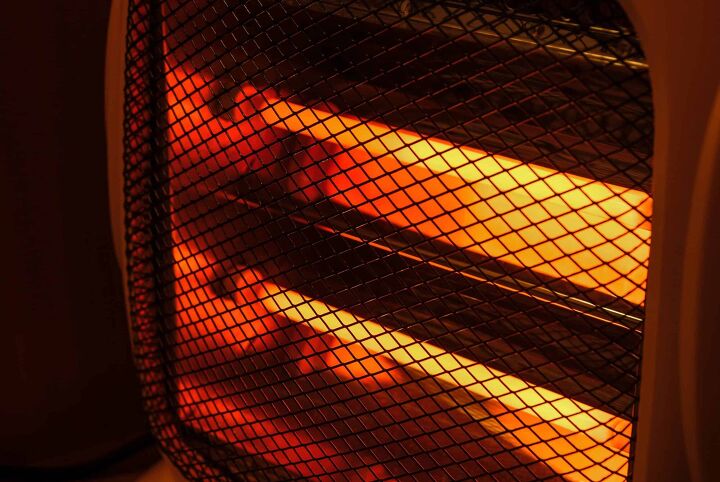









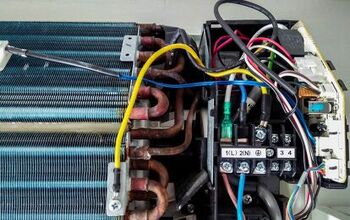







![10 Most Dangerous Neighborhoods in Baltimore [Updated]](https://cdn-fastly.upgradedhome.com/media/2023/07/31/9075655/10-most-dangerous-neighborhoods-in-baltimore-updated.jpg?size=350x220)
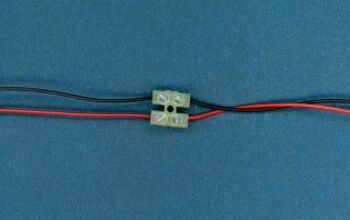
![12 Washing Machine Brands to Avoid [with Recall Data]](https://cdn-fastly.upgradedhome.com/media/2023/07/31/9075781/12-washing-machine-brands-to-avoid-with-recall-data.jpg?size=350x220)

